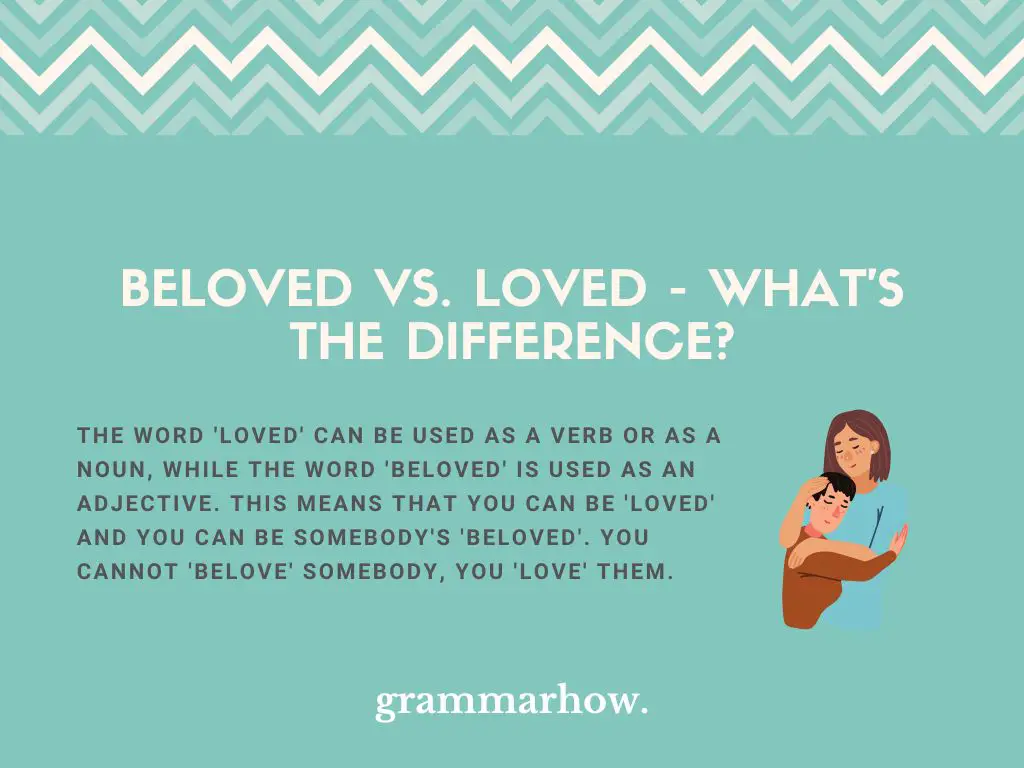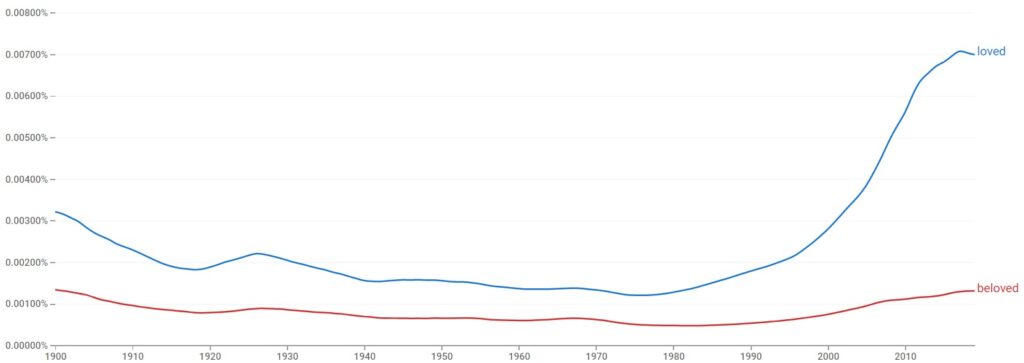The words ‘loved’ and ‘beloved’ are both related to somebody being cared about very much. However, in many cases, these words are not interchangeable. This can cause a bit of confusion. So, let’s look at the difference between ‘beloved’ and ‘loved’, shall we?
Beloved vs. Loved – What’s the Difference?
The word ‘loved’ can be used as a verb or as a noun, while the word ‘beloved’ is used as an adjective. This means that you can be ‘loved’ and you can be somebody’s ‘beloved’. You cannot ‘belove’ somebody, you ‘love’ them.

The word ‘beloved’ is an adjective. This means that it is a description. When you are describing somebody who is loved, you can say ‘beloved’ e.g. ‘my beloved wife’.
The word ‘loved’ can be used as a verb. It is a form of ‘to love’. While it may not seem like it, the word ‘loved’ can be used in either the present or past tense. You have to look at the context to work out what is being said e.g. “she is loved” or “I loved you”.
The word ‘loved’ can also be used as a noun, although this is rarer since the noun is actually ‘love’.
The words ‘loved’ and ‘beloved’ can’t really be used interchangeably. While there are limited situations where you may be able to switch the words up a bit, in most cases, you would need to change the structure of the sentence to accommodate the new word.
Beloved
The word ‘beloved’ is an adjective. It is used to describe somebody that is very loved, whether it is a romantic type of love or a friendship type of love. As a descriptor, it is often paired up with a name.
Here is the definition of ‘beloved’ from The Cambridge Dictionary:
loved very much
Here are some ways that you can use ‘beloved’ in a sentence:
- He was beloved by all.
- My wife is my beloved.
- While she was fine living in the US, she certainly did miss her beloved Brighton.
- She missed her beloved husband.
- He would be marrying his beloved fiance very soon.
Loved
The word ‘loved’ is a verb. It means that you are either currently ‘loving’ somebody, or you have ‘loved’ them in the past. It can be used to describe a romantic feeling, or it can be used to describe the platonic feeling that people have for their friends and family.
According to The Cambridge Dictionary, this is the definition of ‘loved’:
to like another adult very much and be romantically and sexually attracted to them, or to have strong feelings of liking a friend or person in your family.
It is worth noting that while the dictionary definition of ‘loved’ only mentions people, you can have strong feelings towards anything. It doesn’t have to be a person, although one could argue that it isn’t the same type of love. You don’t love a place or food item in the same way that you would love a child, after all.
Here are some examples of how you can use the word ‘loved’ in a sentence:
- She knew that she was very much loved by her husband.
- She loved it whenever she went back to her hometown of Brighton.
- He felt loved by his wife every day of the week.
- The parents loved their children.
- She loved the chocolate cake!
Which Is Used the Most?
According to Google Ngram Viewer, the word ‘loved’ is used a lot more frequently than ‘beloved’.

Although, don’t get us wrong. The word ‘beloved’ is still used a lot, but because it can be used in far fewer situations, it doesn’t get anywhere the same amount of use.
Loved Ones or Beloved Ones?
It is ‘loved ones’. While it is possible, you should not use the word ‘beloved’ to refer to more than one person at a time. Because the word ‘ones’ is plural, the word ‘beloved’ doesn’t really fit with it.
- Correct: She enjoyed being surrounded by loved ones.
- Incorrect: She enjoyed being surrounded by her beloved ones.
If you wanted to make the second a correct sentence, the closest that you could get is with ‘she enjoyed being surrounded by her beloved’, but even that implies there is just one person, not multiple.

Martin holds a Master’s degree in Finance and International Business. He has six years of experience in professional communication with clients, executives, and colleagues. Furthermore, he has teaching experience from Aarhus University. Martin has been featured as an expert in communication and teaching on Forbes and Shopify. Read more about Martin here.
